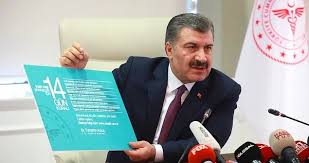More than 300 new COVID-19 cases in one week triggered an alarm for health authorities in Diyarbakir, one of the biggest cities in Turkey’s southeast. Experts fear “a second wave” of cases in the city which managed to reduce the number of cases thanks to strict measures since March. Turkish press also reports rising cases in Southern Cities like Mersin and Gaziantep also report escalating daily case figures. Turkey’s feisty Medical Association issued a report blaming premature easing of social and economic measures for rising cases. Hurriyet Daily News reported that case numbers are 40% higher than estimates provided to Erdogan government, who still isn’t ready to lock down the society a second time.
The new surge comes amid nationwide fear of a new rise in infections after Turkey rolled back major restrictions on June 1. Though it is too early to say if the majority of people ditched measures after restrictions were lifted and therefore, contributed to a rise in cases, the Diyarbakir example may prompt authorities to introduce restrictions again.
Professor Recep Tekin, an infectious disease expert who also heads the COVID-19 intensive care unit at a local hospital, says Diyarbakir was “close to a second wave now and may have more cases in the coming days.” “We almost have difficulty in addressing the increasing number of cases,” Tekin told Demirören News Agency (DHA) on Tuesday. “After the normalization process started, people felt relaxed, wrongly. This contributed to the surge. We had closed clinics last month because of a low number of cases, but we had to reopen them. Our hospital faces a shortage of beds especially due to cases transferred here from districts,” he says. Tekin pointed out that people ignore social distancing rules and did not wear masks in crowded places in the city.
After Turkey started gradually lifting restrictions in May which were imposed to limit the pandemic, media outlets and social media are awash with photos and videos of people mingling freely, sometimes not wearing masks, despite the existing risk of infection. The government will hold its weekly meeting on Tuesday and is expected to discuss whether to impose some restrictions again though the number of new cases remains relatively low.
‘It is not over’
Turkish President Recep Tayyip Erdogan warned the public on Monday that the pandemic was not over just because the government lifted restrictions. Speaking in a televised interview, Erdogan called on the public to comply with rules for wearing masks, keeping social distance and personal hygiene. “I plead to my dear nation to be careful on these three issues. Please do not neglect wearing masks, especially in closed spaces and keep a distance of at least 1.5 meters (4.9 feet) away from other people,” he said.
Professor Önder Ergönül, an infectious disease expert, says Turkey may need to bring back restrictions in case of a surge in cases in the next five days. Speaking to Demirören News Agency (DHA) on Tuesday, he warned about low immunity to the virus. “Some limited studies show the herd immunity is about 5% now. It may even be lower. So, it is too early to relax measures we should comply with,” he said. He pointed out that the average incubation period of the virus was five to six days and they may see new cases in the coming days, warning citizens not to act “too careless.” “As the public, we have to be careful in following the rules recommended by the Health Ministry.”
Turkish Medical Association: ‘Normalization’ process is worrying
Turkish Medical Association’s (TTB) Governing Council said that, in the fight against Covid-19, Turkey had not yet overcome the first wave and that it was concerned about the ‘normalization’ process.
TTB’s concerns were listed in the following statement: “The epidemic continues, Turkey has not yet fully recovered the first wave, but is forced into a rapid process called “normalization” by the public. Although the number of cases decreased with a fluctuating course, we have seen that most of the restrictions have been lifted since the week we were in, in an environment where the epidemic continued. ”
‘Community participation should be ensured’
In the report that it is stated that the measures to control the spread of the disease should be continued without disruption, while the measures to be taken during the ‘normalization’ period are listed as follows: “It should be proved that the transmission of Covid-19 is under control. The health system should be able to detect, isolate, test and treat every case, and monitor and quarantine every contact person. The risk of outbreaks should be minimized in areas where sensitive populations such as retirement homes, rehabilitation centers, some hospitals, prisons are located and in disadvantaged communities such as refugees.
Schools, factories, workplaces must strictly follow physical distance, install hand washing facilities, respiratory hygiene and body temperature monitoring etc. The risk of entry of new cases into and out of those communities with high risk of contamination should be manageable. Communities should be informed about the transition process and ensured their participation in this process. ”
TTB underlined that “decisions should not be affected by populism” during the pandemic, and the steps to be taken should meet the standards of a democratic state; “economic and social needs will be met with state aid while the epidemic lasts”.
You can follow our English language YouTube videos @ REAL TURKEY: https://www.youtube.com/channel/UCKpFJB4GFiNkhmpVZQ_d9Rg
And content at Twitter: @AtillaEng
Facebook: Real Turkey Channel: https://www.facebook.com/realturkeychannel/
